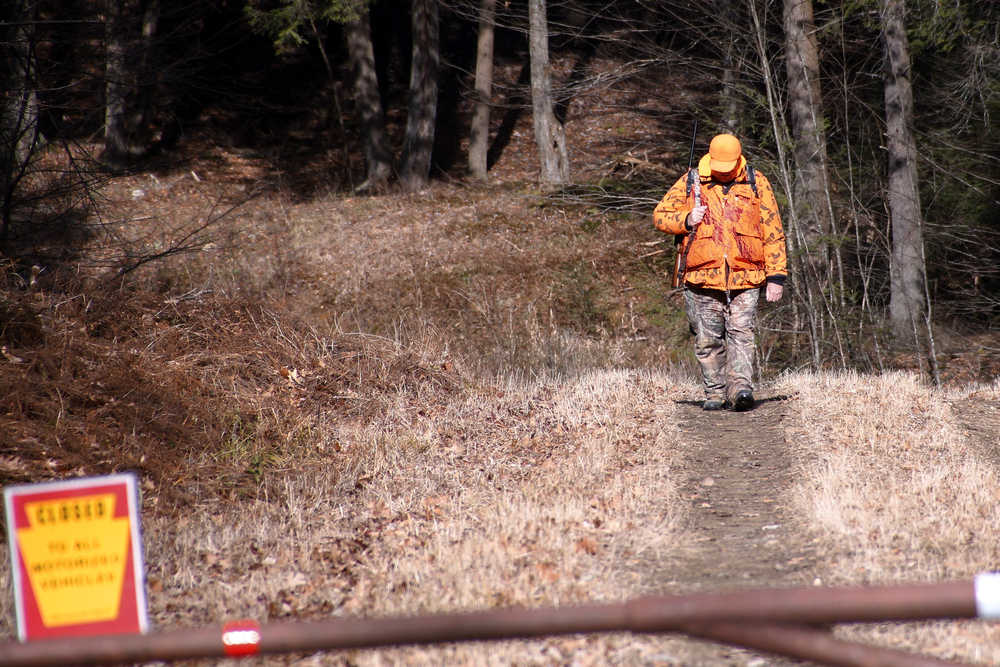FISHER, Pa. — Yo, hunters! Deer here.
The Pennsylvania Game Commission is giving hunters an assist this year, using bright yellow-and-green signs to steer them to sections of state game lands where it is working to restore the forest vegetation that attracts deer.
It’s a reversal of past practice, when the commission spent hundreds of thousands of dollars annually to erect fences — which hunters generally hated — to keep deer out of areas where the habitat is being actively managed.
By pointing hunters to the 35 newly created “Deer Hunter Focus Areas” spread across 30 counties, the Game Commission hopes enough deer will be killed in actively managed areas to safeguard the rebounding vegetation meant to draw deer in the first place.
“It looks to me like a good program,” said Jeff Mulhollem, editor of the Pennsylvania edition of Outdoor News. “If they can lure deer to these areas, then the hunters benefit, the deer benefit and the Game Commission benefits.”
The plan is to help get hunters into the best habitats — “where the deer are going to be,” said David Gustafson, the chief forester for the game commission. The focus areas “are not costing us anything, they’re saving us money,” he said. “The only thing it’s costing us is putting up some signs.”
With firearm deer season opening Monday, the Game Commission and sportsmen alike see helping Pennsylvanians have a successful hunt as important to the future of the sport. The number of deer hunters has dropped from about 1.4 million 30 years ago to fewer than 1 million today.
“If you go to take your gun for a walk year after year after year, it’s no fun anymore,” said Randy Santucci, board chairman and southwest regional director of the Unified Sportsmen of Pennsylvania. “And that kid’s going to look at his dad and say, ‘This is no fun,’ then you’re going to lose the kid, too.”
Pennsylvania hunters have been critical of past herd management practices. More than 60 percent of Mulhollem’s readers were against the idea of the focus areas in a recent online poll.
“A lot of them just distrust everything the Game Commission does,” Mulhollem said, adding that he doesn’t share that opinion.
About 15 years ago, the Game Commission decided to thin the state’s deer herd to let habitats recover from over-browsing. The state established a two-week season in which hunters could kill both bucks and does instead of a two-week buck season followed by just three days of doe hunting. Doe season has since been scaled back to the second week of buck season in much of the state.
But the habitat, it turned out, did not recover as predicted. That means there are now fewer — and harder to find — deer, at least on public lands being managed by the state.
The new focus areas generally are those where taller timber has been cut down so that lower-lying vegetation that deer eat can flourish. In some areas, controlled burning is also used to promote the growth of oak trees and to get rid of a deep carpet of fallen leaves that can also hamper those plants, Gustafson said.
The commission earns millions of dollars annually from timber sales. But Gustafson wants hunters to see the habitat benefits, too.
If the program proves popular, more and different focus areas might be developed in the future, Gustafson said. Right now, the focus areas combined are only about 2,000 acres out of 1.5 million acres of state game lands the commission manages.
Santucci’s hunter advocacy group has fought commission policies for years, and he isn’t buying the new effort.
“When I see stuff like, ‘We’re gonna give you a little direction to some hot spots, well, you shouldn’t need hot spots if the herd was managed correctly,” Santucci said. “It’s a Band-Aid on a heart attack.”
Gustafson disagrees with Santucci, but not completely.
“Looking back on past history, I can see his perspective and we should have been doing this all along,” he said.
On Monday, Bob Zimmerman of Greensburg was hunting bear and doing some pre-season deer scouting in state game lands 80 miles northeast of Pittsburgh when he saw one of the signs for the hunter focus areas.
“We pay enough for our license fees, I’m glad to see them spend some money to help us out,” he said.

